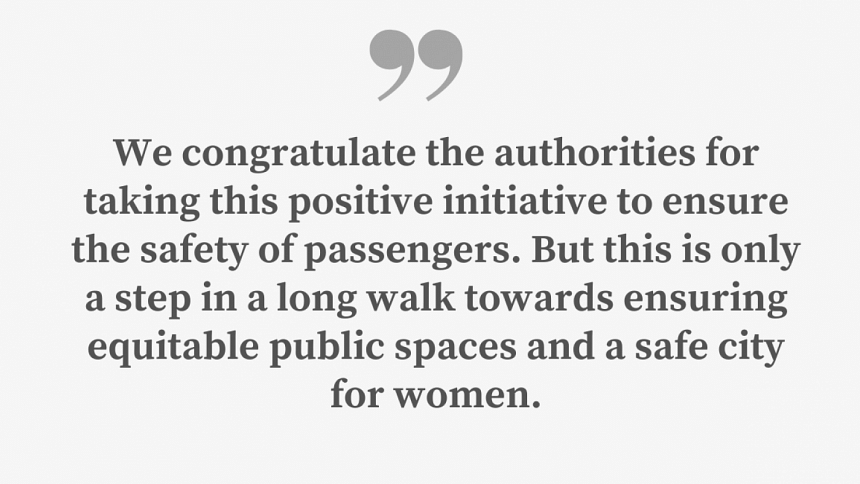CCTV on buses but a drop in the ocean

We are glad to note that the installation of CCTV cameras on some Dhaka city public buses, under the auspices of the Ministry of Women and Children Affairs, has generated a welcome response from commuters as well as bus staffers. Female commuters have reported that various forms of sexual harassment such as inappropriate touching and groping by helpers and other commuters have gone down, which used to be a common occurrence a few months back. Male commuters, too, are welcoming the move, arguing there will be fewer chances of false accusations of harassment. Drivers and conductors say that they have not received even a single complaint of any kind of harassment since the installation of cameras, and the people in charge of monitoring at Genex Infosys Ltd mirror that sentiment. The number of other crimes on buses has also reportedly gone down, as there is now a camera to record any pickpocketing and other such crimes.
There is no doubt that this is positive news for people who rely on buses for their everyday commute, especially women, for whom journeying on public transport is a battle on its own. However, as of now, CCTV cameras have been installed in only 100 buses, which is only one percent of the 9,311 registered buses that ply the capital, according to the Bangladesh Road Transport Authorities. Given the success of the initiative, it is imperative that we increase its coverage so that more women can use buses without having to fear harassment; moreover, success of the initiative will depend on how effectively the cameras are monitored and what steps are taken against any perpetrators who are identified.

Another thing that we must keep in mind is that these cameras constitute a form of mass surveillance. In the age of increasing surveillance from various state and non-state actors, we remain cognizant of its potential for misuse, and urge the authorities to ensure that such surveillance is only conducted for the greater good. Furthermore, we would like to remind them that surveillance alone is not an effective deterrent in the long run, if it is not accompanied by awareness-raising initiatives to change people's perceptions and patriarchal systems at large.
We congratulate the authorities for taking this positive initiative to ensure the safety of passengers. But this is only a step in a long walk towards ensuring equitable public spaces and a safe city for women. In a country where a large majority of women face sexual harassment regularly and, in turn, conviction rates of cases of sexual violence are abysmally low, the authorities will have to do more than just install a few cameras to make the lives of women in the country easier.


 For all latest news, follow The Daily Star's Google News channel.
For all latest news, follow The Daily Star's Google News channel. 






Comments